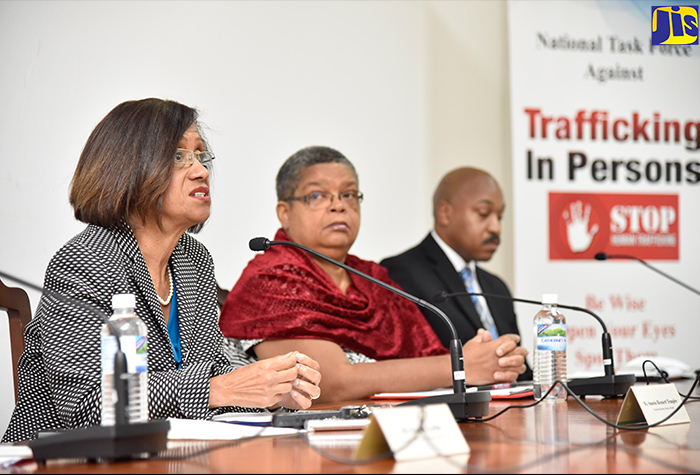Training for Healthcare Workers to Deal with Human-Trafficking Victims
By: , January 9, 2018The Key Point:
The Facts
- This was disclosed by Permanent Secretary in the Ministry of Health, Sancia Bennett Templer, at the launch of the Standard Operating Procedures (SOPs) for health officials to deal with victims of human trafficking, at the Ministry of Justice, Constant Spring Road in St. Andrew on January 8.
- “We have to break this cycle of violence, and, clearly, the health sector has a very important role to play in this regard. Training has been done in the past, but we do have turnover of staff, so it’s very useful that there is the training plan, which would include 500 health workers starting in 2018,” she said.
The Full Story
Five hundred healthcare workers in the public and private sectors will be trained this year to enable them to better identify and treat with victims of human trafficking.
This was disclosed by Permanent Secretary in the Ministry of Health, Sancia Bennett Templer, at the launch of the Standard Operating Procedures (SOPs) for health officials to deal with victims of human trafficking, at the Ministry of Justice, Constant Spring Road in St. Andrew on January 8.
She said it is important for healthcare workers engaged in primary care, emergency care, mental health and paediatrics to be positioned to identify victims of human trafficking, noting that as many as 88 per cent of sex-trafficking victims may end up at health facilities.
“Health plays an important role because, oftentimes, these persons may go to health facilities because of any health crisis that may arise while they are here in Jamaica or while they are held in these kinds of circumstances,” she said.
The Permanent Secretary said healthcare workers who are educated about the risks and clinical manifestations of human trafficking can provide efficient and compassionate assistance to patients.
“We have to break this cycle of violence, and, clearly, the health sector has a very important role to play in this regard. Training has been done in the past, but we do have turnover of staff, so it’s very useful that there is the training plan, which would include 500 health workers starting in 2018,” she said.
Mrs. Bennett Templer noted that a video feature will be developed on human trafficking that will be used as part of the orientation of all clinicians entering the health system.
She added that a reference guide and poster for clinicians have also been developed and will be distributed; and ongoing education sessions will be enhanced by the training of health educators and in-service educators to build their capacity to deliver training on human trafficking.
She congratulated the National Task Force Against Trafficking in Persons for completion of the document, and recognised the work of all the stakeholders who have been integral to the process.
For her part, Permanent Secretary in the Ministry of Justice, Carole Palmer, said the health SOPs affirm the country’s commitment to fight the horrendous, international criminal network.
“Indeed, it is the latest important step the country is taking to implement and establish best practices in how we treat victims of human trafficking,” she said.
Mrs. Palmer, who is also Chairman of the National Task Force Against Trafficking in Persons, said the SOPs recommend that the authorities should not be called without the consent of the victims, in light of the potentially legitimate concerns regarding the well-being of victims and their loved ones.
“On the other hand, this constraint does not apply in the case of children and adolescents who may require immediate placement in State care,” she pointed out.
Mrs. Palmer encouraged health workers to use the protocols and guidelines effectively, efficiently and compassionately to deal with victims and sufferers.
The document is titled ‘Management of Suspected Victims of Trafficking in Persons Protocol for Health Workers’. It is designed to be used as a guide and contains pertinent information concerning the identification and protection of victims.
It provides guidelines relating to the stabilisation of patients, importance of confidentiality, requisite documentation, consent and referral of suspected victims.

